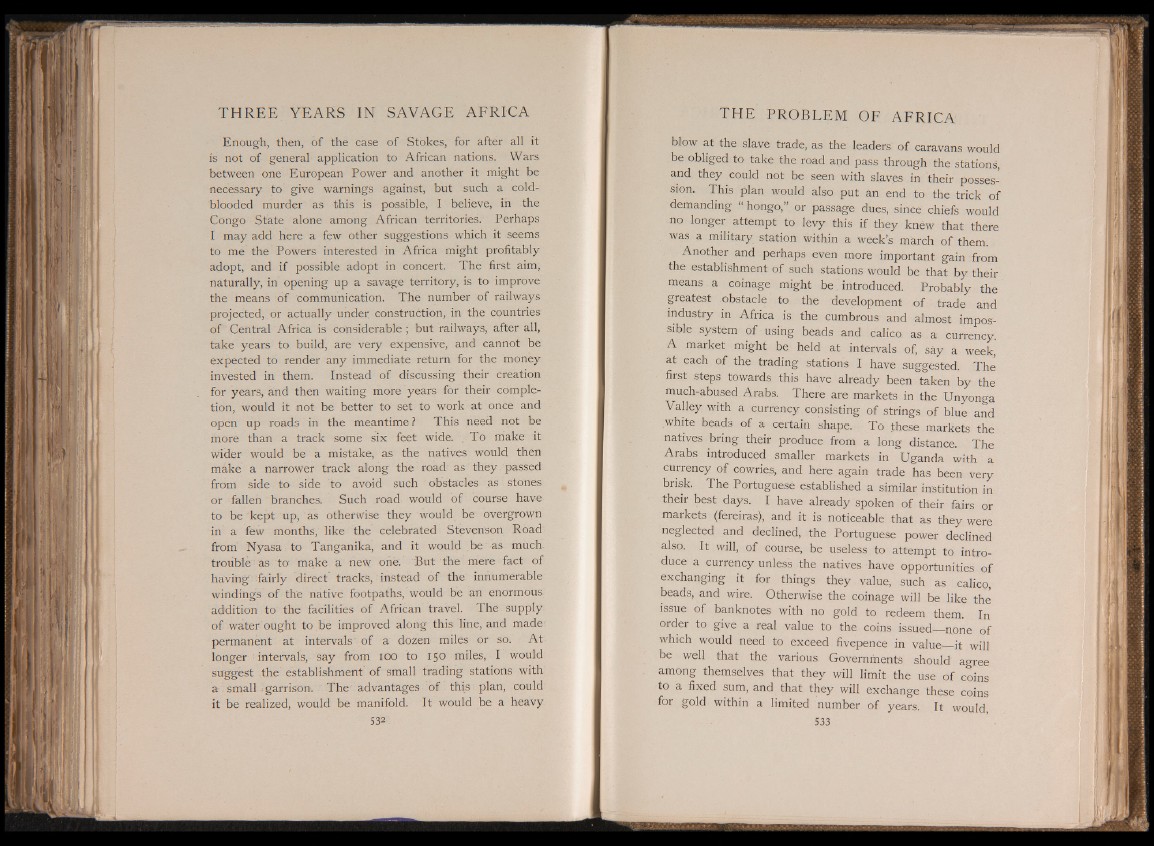
Enough, then, of the case of Stokes, for after all it
is not of general application to African nations. Wars
between one European Power and another it might be
necessary to give warnings against, but such a coldblooded
murder as this is possible, I believe, in the
Congo State alone among African territories. Perhaps
I may add here a few other suggestions which it seems
to me the Powers interested in Africa might profitably
adopt, and if possible adopt in concert. The first aim,
naturally, in opening up a savage territory, is to improve
the means of communication. The number of railways
projected, or actually under, construction, in the countries
of Central Africa is considerable; but railways, after all,
take years to build, are very expensive, and cannot be
expected to render any immediate return for the money
invested in them. Instead of discussing their creation
for years, and then waiting more years for their completion,
would it not be better to set to work at once and
open up roads in the meantime ? This need not be
more than a track some six feet wide. , To make it
wider would be a mistake, as the natives would then
make a narrower track along the road as they passed
from side to side to avoid such obstacles as stones
or fallen branches. Such road would of course have
to be kept up, as otherwise they would be overgrown
in a few months, like the celebrated Stevenson Road
from Nyasa to Tanganika, and it would be as much
trouble as to make a new one. But the mere fact of
having" fairly direct tracks, instead of the innumerable
windings of the native footpaths, would be an enormous
addition to the facilities of African travel. The supply
of water ought to be improved along this line, and made
permanent at intervals'of a dozen miles or so. At
longer intervals, say from 100 to 150 miles, I would
suggest the establishment of small trading stations with
ar small - garrison. The' advantages of this plan, could
it be realized, would be manifold. It would be a heavy
532
blow at the slave trade, as the leaders of caravans would
be obliged to take the road and pass through the stations,
and they could not be seen with slaves in their possession.
This plan would also put an end to the trick of
demanding “ hongo,” or passage dues, since chiefs would
no longer attempt to levy this if they knew that there
was a military station within a week’s march of them.
Another and perhaps even more important gain from
the establishment of such stations would be that by their
means a coinage might be. introduced. Probably the
greatest obstacle to the development of trade and
industry in Africa is the cumbrous and almost impossible
system of using beads and calico as a currency.
A market might be held at intervals of, say a week,
at each of the trading stations I have suggested. The
first steps towards this have already been taken by the
much-abused Arabs. There are markets in the Unyonga
Valley with a currency consisting of strings of blue and
white beads of a certain shape. To these markets the
natives bring their produce from a long distance. The
Arabs introduced smaller markets in Uganda with a
currency of cowries, and here again trade has been very
brisk. The Portuguese established a similar institution in
their best days. I have already spoken of their fairs or
markets (fereiras), and it is noticeable that as they were
neglected and declined, the Portuguese power declined
also. It will, of course, be useless to attempt to introduce
a currency unless the natives have opportunities of
exchanging it for things they value, such as calico,
beads, and wire. Otherwise the coinage will be like thè
issue of banknotes with no gold to redeem them. In
order to give a real value to the coins issued—none of
which would need to exceed fivepence in value it will
be well that the various Governments should agree
among themselves that they will limit the use of coins
to a fixed sum, and that they will exchange these coins
for gold within a limited number of years. It would,
S33